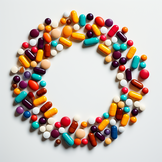Recommended frequency and dosage of viagra and maximum safe dosage.
- Understanding Viagra and its Purpose
- Dosage Considerations for Individuals on Alpha-Blockers
- Standard Dosages and Recommended Frequency
- Adjustments for Mild ED or Experiencing Side Effects
- Dosage Adjustments for Older Men and Individuals with Liver or Kidney Problems
- Following Prescribed Dosage to Avoid Side Effects
- Managing a Viagra Overdose
- Maximum Safe Dosage of Viagra

Understanding Viagra and its Purpose
Viagra, also known as sildenafil, is a medication that is predominantly used to treat erectile dysfunction (ED), a condition where men find it hard to achieve or maintain an erection. This medication enhances blood flow to the penis, thus aiding in the attainment of an erection during sexual activity.
Dosage Considerations for Individuals on Alpha-Blockers
Alpha-blockers are medications often prescribed for high blood pressure or prostate conditions. If an individual is on alpha-blockers, their healthcare provider must consider dosage adjustments for Viagra. This is because the concurrent use of these medications could potentially lead to a significant drop in blood pressure. Thus, for safety reasons, the dosage of Viagra is often adjusted accordingly.
Standard Dosages and Recommended Frequency
Viagra is typically available in three standard dosages: 25mg, 50mg, and 100mg. The recommended starting dose for most men is 50mg, taken as needed about 1 hour before sexual activity. However, depending on the individual's response and tolerance, the dosage can be increased to a maximum recommended dosage of 100mg per day or reduced to 25mg. It is essential to note that Viagra should not be taken more than once per day, regardless of the dosage.
Adjustments for Mild ED or Experiencing Side Effects
For men with mild ED or those who experience side effects from the 50mg dose, a decrease in the dosage to 25mg might be appropriate. The Food and Drug Administration (FDA) has approved this lower dose, acknowledging that it could be enough for some patients and could also potentially reduce side effects.
Dosage Adjustments for Older Men and Individuals with Liver or Kidney Problems
As we age, our body's ability to metabolize medications decreases, often leading to higher levels of the drug in the bloodstream. Consequently, men over 65 years of age might need to start with the lower dose of 25mg. Similarly, those with liver or kidney problems may need dosage adjustments due to potential difficulties in metabolizing the drug.
Following Prescribed Dosage to Avoid Side Effects
The prescribed dosage from a healthcare provider should always be adhered to. Taking more than the maximum recommended dosage of 100mg of Viagra can lead to adverse side effects, including headaches, flushing, or changes in vision. In severe cases, an overdose can result in more serious health complications such as priapism, an erection that lasts more than four hours, and could require immediate medical attention.
Managing a Viagra Overdose
In the event of a suspected overdose, it is vital to contact a healthcare provider or seek emergency medical attention immediately. Overdosing on Viagra is not only dangerous but can lead to severe health complications.
Maximum Safe Dosage of Viagra
The maximum safe dosage of Viagra is 100mg per day.
Taking more than this prescribed limit may lead to overdosing and its associated side effects.
In conclusion, Viagra, when taken correctly and as prescribed by a healthcare provider, can help men with ED achieve and maintain an erection. However, dosage adjustments may be necessary depending on the individual's health status, age, and response to the medication. Always consult a healthcare provider to determine the most appropriate dosage and frequency of Viagra for optimal results and minimal side effects.



